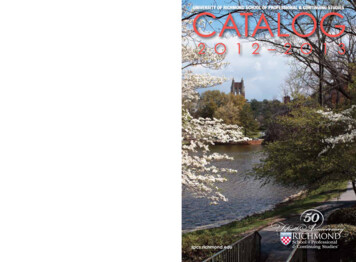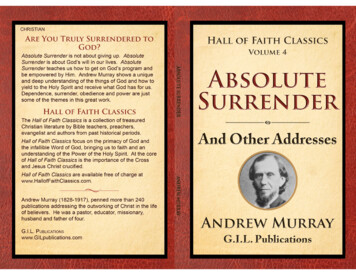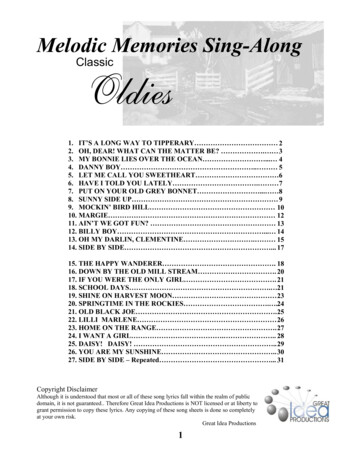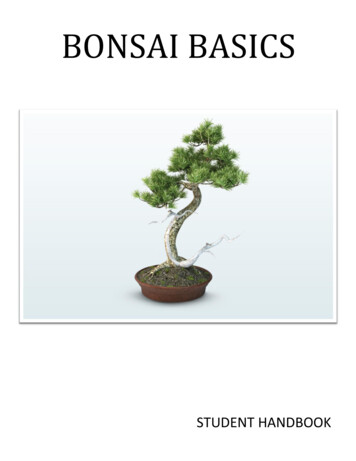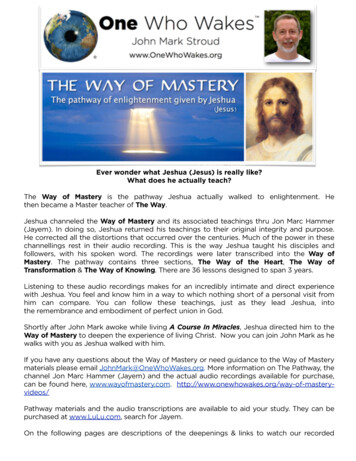
Transcription
The Way Into the HoliestAuthor(s):Meyer, F.B. (1847-1929)Publisher:Grand Rapids, MI: Christian Classics Ethereal LibraryDescription:Subjects:F.B. Meyer's detailed exposition of the book of Hebrewsbrings to readers the rich lessons contained within the anonymously authored epistle. Meyer intended The Way Intothe Holiest to draw attention to the substitutionary aspect ofChrist's death. Meyer believed that Christians consistentlyoveremphasized the necessity of religious rituals, ultimatelyforgetting the surpassing power of salvation and sanctification. Meyer writes freely of the dignity of Christ and the gloryof His office, reminding Christians of their duty to worshipHim. Through his words, Meyer incites Christians to rejoicein Christ's merciful and faithful salvation, by which our repentant spirits are revived. This spiritual commentary successfullyanswers many questions of Christology and presents awonderful depiction of the Christian life.Emmalon DavisCCEL Staff WriterThe BibleNew TestamentSpecial parts of the New Testamenti
ContentsTHE WAY INTO THE HOLIEST:1PREFACE.2I. THE WORD OF GOD.3II. THE DIGNITY OF CHRIST7III. THE GLORY OF CHRIST'S OFFICE10IV. DRIFTING14V. “WHAT IS MAN?”19VI. “Perfect through sufferings”24VII. THE DEATH OF DEATH28VIII. CHRIST'S MERCIFUL AND FAITHFUL HELP32IX. A WARNING AGAINST UNBELIEF36X. THE GOSPEL OF REST42XI. THE WORD OF GOD AND ITS EDGE47XII. TIMELY AND NEEDED HELP52XIII. GETHSEMANE57XIV. IMPOSSIBLE TO RENEW TO REPENTANCE63XV. THE ANCHORAGE OF THE SOUL.67XVI. THE PRIESTHOOD OF CHRIST71XVII. THE SUPERLATIVE GREATNESS OF CHRIST.76XVIII. THE TRUE TABERNACLE81XIX. THE TWO COVENANTS85XX. THE HEAVENLY THINGS THEMSELVES.90XXI. TEACHING BY CONTRAST95XXII. THE BLOOD OF CHRIST100XXIII. “ONCE”104XXIV. AN ANCIENT HEBREW CUSTOM109ii
XXV. DRAWING BACK114XXVI. FAITH AND ITS EXPLOITS118XXVII. STRIPPING FOR THE RACE122XXVIII. CHASTISEMENT128XXIX. THE IDEAL LIFE133XXX. SINAI AND SION138XXXI. THE THINGS THAT CANNOT BE SHAKEN142XXXII. GOD A CONSUMING FIRE.147XXXIII. THE UNCHANGING SAVIOR152XXXIV. THE ESTABLISHED HEART158XXXV. THE CLOSING PRAYER163Indexes168Index of Scripture References169Index of Scripture Commentary171iii
This PDF file is from the Christian Classics Ethereal Library, www.ccel.org. The mission ofthe CCEL is to make classic Christian books available to the world. This book is available in PDF, HTML, ePub, Kindle, and other formats. Seehttp://www.ccel.org/ccel/meyer/into holiest.html. Discuss this book online at http://www.ccel.org/node/2873.The CCEL makes CDs of classic Christian literature available around the world through theWeb and through CDs. We have distributed thousands of such CDs free in developingcountries. If you are in a developing country and would like to receive a free CD, pleasesend a request by email to cd-request@ccel.org.The Christian Classics Ethereal Library is a self supporting non-profit organization atCalvin College. If you wish to give of your time or money to support the CCEL, please visithttp://www.ccel.org/give.This PDF file is copyrighted by the Christian Classics Ethereal Library. It may be freelycopied for non-commercial purposes as long as it is not modified. All other rights are reserved. Written permission is required for commercial use.iv
THE WAY INTO THE HOLIEST:THE WAY INTO THE HOLIEST:EXPOSITIONS OF THE EPISTLE TO THEHEBREWS.F.B. Meyers B.A.,Author of:"Tried by fire"; "The Life and Light of Men";"The Psalms: Notes on Readings";etc., etc.Baker Book HouseGrand Rapids Mich.1951Edited by Larry HendricksonP.O. box 295 Lowell, OR 974521
PREFACE.PREFACE.This Epistle bears no name of author, or designationof church. But it needs neither. Inevery sentence we can detect the Authorshipof the Holy Ghost: and feel that it has a messagenot to one age, but to all; not to one community, but to the universal Church.We do not therefore discuss questions which are amply treated in every commentary;but set ourselves at once to derive those great spiritual lessons which are enshrined in thesesublime words.And probably there is no better way of vindicating the authority of the Pentateuch thanby showing that it lay at the basis of the teaching of the early Church; and that especiallythe Book of Leviticus was the seed-plot of New Testament Theology.There are two strong tendencies flowing around us in the present day: the one, to minimize the substitutionary aspect of the death of Christ; the other, to exaggerate the importanceof mere outward rite. To each of these the study of this great Epistle is corrective. We aretaught that our Lord's death was a Sacrifice. We are taught also that we have passed fromthe realm of shadows into that of realities.These chapters are altogether inadequate for the treatment of so vast a theme; but suchas they are, they are sent forth, in dependence on the Divine Blessing, in the fervent hopethat they may serve to make more clear and plain to those who would find and enter it, theWay into the Holiest of all.F.B. MEYER.Editors note.I have endeavored to remain true to the original manuscript as was delivered to me. Idid, however, make some punctuation correction so as to make it more readable to thecomputer audience. Namely, I replaced a few hyphens where I saw them confusing thetext. I also corrected a couple of obvious errors found in the original printing. If thesechanges cause any confusion I, alone, take full responsibility; please e-mail me atrlarryh@teleport.com and I will make any corrections necessary.Larry Hendrickson2
I. THE WORD OF GOD.I. THE WORD OF GOD."GOD—who at sundry times and in divers manners spake in time past unto the fathersby the prophets, hath in these last days spoken unto us by his Son." HEBREWS i. 1,2.GOD." What word could more fittingly stand at the head of the first line of the firstparagraph in this noble epistle! Each structure must rest on him as foundation; each treemust spring from him as root; each design and enterprise must originate in him as source."IN THE BEGINNING-GOD," is a worthy motto to inscribe at the commencement of everytreatise, be it the ponderous volume or the ephemeral tract. And with that name we commence our attempt to gather up some of the glowing lessons which were first addressed tothe persecuted and wavering Hebrews in the primitive age, but have ever been most highlyprized by believing Gentiles throughout the universal Church. The feast was originallyspread for the children of the race of Abraham; but who shall challenge our right to thecrumbs? In our endeavor to gather them, be thou, God, Alpha and Omega, First and Last.In the original Greek, the word "God"is preceded by two other words, which describe thevariety and multitudinousness of his revelation to man. And the whole verse is full of interestas detailing the origin and authority of the Word of God, and as illustrating the great lawwhich appears in so many parts of the works of God, and has been fitly called the law ofVARIETY IN UNITY.That law operates in Nature. The earliest book of God. No thoughtful man can lookaround him without being arrested by the infinite variety that meets him on every side. "Allflesh is not the same flesh; . . . there are celestial bodies, and bodies terrestrial: but the gloryof the celestial is one; and the glory of the terrestrial is another. . . . One star differeth fromanother star in glory." You cannot match two faces in a crowd; two leaves in a forest; or twoflowers in the woodlands of spring. It w ld seem as if the molds in which natural productsare being shaped are broken up and cast aside as soon as one result has been attained. Andit is this which affords such an infinite field for investigation and enjoyment, forbidding allfear of monotony or weariness of soul.And yet, amid all natural variety, there is a marvelous unity. Every part of the universeinterlocks by subtle and delicate links with every other part. You cannot disturb the balanceanywhere without sending a shock of disturbance through the whole system. Just as in somemajestic Gothic minster the same idea repeats itself in bolder or slighter forms, so do thesame great thoughts recur in tree and flower, in molecule and planet, in diatom and man.And all this because, if you penetrate to Nature's heart, you meet God. "Of him, and throughhim, and to him, are all things." "There are diversities of operations; but it is the same Godwhich worketh all in all." The unity that pervades Nature's temple is the result of its having3
I. THE WORD OF GOD.originated from one mind, and having been effected by one hand, the mind and hand ofGod.That law also operates throughout the Scriptures. There is as great variety there as inNature. They were written in different ages. some in the days of "the fathers"; others at "theend of these days" for us. In the opening chapters, under the guidance of the Spirit of God,Moses has embodied fragments of hallowed tradition, which passed from lip to lip in thetents of the patriarchs; and its later chapters were written when the holy city, Jerusalem, hadalready been smitten to the ground by the mailed hand of Titus.They were written in different countries: these in the deserts of Arabia; those under theshadow of the pyramids; and others amid the tides of life that swept through the greatestcities of Greece and Rome. You can detect in some the simple pastoral life of Palestine; inothers the magnificence of Nebuchadnezzar's empire. In one there is the murmur of theblue Aegean; and in several the clank of the fetter in the Roman prison-cell.They were written by men belonging to various ranks, occupations, and methods ofthought. shepherds and fishermen, warriors and kings; the psalmist, the prophet, and thepriest; some employing the stately religious Hebrew, others the Chaldaic patois, others thepolished Greek-every variety of style, from the friendly letter, or sententious proverb, to thenational history, or the carefully prepared treatise, in which thought and expression glowas in the fires--but all contributing their quota to the symmetry and beauty of the whole.And yet, throughout the Bible, there is an indubitable unity. What else could have ledmankind to look upon these sixty-six tractlets as being so unmistakably related to eachother that they must be bound up together under a common cover? There has been somethingso unique in these books that they have always stood and fallen together. To disintegrateone has been to loose them all. Belief in one has led to belief in all. Their hands are linkedand locked so tightly that where one goes all must follow. And though wise and clever menhave tried their best, they have never been able to produce a single treatise containing thatundefinable quality which gives these their mysterious oneness; and to lack which is fatalto the claims of any book to be included with them, or to demand the special venerationand homage of mankind.The world is full of religious books; but the man who has fed his religious life upon theBible will tell in a moment the difference between them and the Scriptures of the Old andNew Testaments. The eye can instantly detect the absence of life in the artificial flower; thetongue can immediately and certainly detect the absence or presence of a certain flavorsubmitted to the taste; and the heart of man, his moral sense, is quick to detect the absencein all other religious books of a certain savor which pervades the Bible, from Genesis, thebook of beginnings, to the Apocalyptic announcements of the quick coming of the King.And in the possession of this mysterious attribute, the Old and new Testaments areone. You cannot say there is more of it in the glowing paragraphs of the Apostle Paul than4
I. THE WORD OF GOD.in the splendid prophecies and appeals of the great evangelic prophet, Isaiah. It is certainlyin the Gospels; but it is not less in the story of the Exodus. Throughout, there is silence ontopics which merely gratify curiosity, but on which other professed revelations have beencopiously full. Throughout, there is no attempt to give instruction on science or nature; butto bend all energy in discussing the claims of God on men. Throughout, the crimson cordof sacrifice is clearly manifest, on which the books are strung together as beads upon athread. And throughout, there is ever the subtle, mysterious, ineffable quality called Inspiration: a term which is explained by the majestic words of this opening verse, "God, havingspoken of old to the fathers, hath at the end of these days spoken to us."Scripture is the speech of God to man. It is this which gives it its unity. "The Lord, themighty God, hath spoken, and called the earth." The amanuenses may differ; but the inspiringmind is the same. The instruments may vary; but in every case the same theme is beingplayed by the same master-hand. We should read the Bible as those who listen to the veryspeech of God. Well may it be called "the Word of God."But the Scripture is God's speech in man. The heavenly treasure is in vessels of earth."He spake unto the fathers in the prophets. . . He hath spoken unto us in his Son." It is veryremarkable to study the life of Jesus, and to listen to his constant statements as to the sourceof his marvelous words. So utterly had he emptied himself, that he originated nothing fromhimself; but lived by the Father, in the same way as we are to live by him. He distinctly declared that the words he spake, he spake not of himself; but that words and works alike werethe outcome of the Father, who dwelt within. Through those lips of clay the eternal Godwas speaking. Well might he also be called "the Word of God"!And here the words of the prophets in the Old Testament are leveled up to the plane ofthe words of Jesus in the New. Without staying to make the least distinction, our writer tellus, beneath the teaching of the Spirit, that he who spake in the one spake also in the others.Let us then think with equal reverence of the Old Testament as of the New. It was our Saviour's Bible. It was the food which Jesus loved, and lived upon. He was content to fast fromall other food, if only he might have this. It was his one supreme appeal in conflict with thedevil, and in the clinching of his arguments and exhortations with men. And here we discover the reason. The voice of God spake in the prophets, whose very name likens them tothe up-rush of the geyser from its hidden source.As God spake in men, it is clear that he left them to express his thoughts in the language,and after the method, most familiar to them. They will speak of Nature just as they havebeen accustomed to find her. They will use the mode of speech whether poem or prosewhich is most habitual to their cast of thought. They will make allusions to the events transpiring around them, so as to be easily understood by their fellows. But, whilst thus left toexpress God's thoughts in their own way, yet most certainly the divine Spirit must have5
I. THE WORD OF GOD.carefully superintended their utterances, so that their words should accurately convey hismessages to men.In many parts of the Bible there is absolute dictation, word for word. In others, there isdivine superintendence guarding from error, and guiding in the selection and arrangementof materials: as when Daniel quotes from historic records; and Moses embodies the sacredstories which his mother had taught him beside the flowing Nile. In all, there is the full inspiration of the Spirit of God, by whom all Scripture has been given. Holy men spake asthey were moved by the Holy Spirit, . . . searching what, or what manner of time, the Spiritof Christ which was in them did signify" (2 Tim. iii. i6 ; 2 Pet. i. 20, 21 ; 1 Pet. i. ii).We need not deny that other men have been illuminated; but the difference betweenillumination and inspiration is as far as the east is from the west. Nor do we say that Godhas not spoken in other men, or in these men at other times; but we do say that only in theBible has God given the supreme revelation of his will, and the authoritative rule of our faithand practice. The heart of man bears witness to this. We know that there is a tone in thesewords which is heard in no other voice. The upper chords of this instrument give it a timbrewhich none other can rival.The revelation in the Old Testament was given in fragments (or portions). This is themeaning of the word rendered in the Old Version sundry times, and in the Revised diversportions. It refers, not to the successive ages over which it was spread, but to the numerous"portions" into which it was broken up. No one prophet could speak out all the truth. Eachwas intrusted with one or two syllables in the mighty sentences of God's speech. At the bestthe view caught of God, and given to men through the prophets, though true, was partialand limited.But in Jesus there is nothing of this piecemeal revelation. "In him dwelleth all the fullnessof the Godhead bodily." He hath revealed the Father. Whosoever hath seen him hath seenGod; and to hear his words is to get the full-orbed revelation of the Infinite.The earlier revelation was in many forms. The earthquake, the fire, the tempest, andthe still small voice-each had its ministry. Symbol and parable, vision and metaphor, typeand historic foreshadowing, all in turn served the divine end; like the ray which is brokeninto many prismatic hues. But in Jesus there is the steady shining of the pure ray of his glory,one uniform and invariable method of revelation.Oh the matchless and glorious Book, the Word of God to men-to us; revealing not onlyGod, but ourselves; explaining moods for which we had no cipher; touching us as no otherbook can, and in moments when all voices beside wax faint and still; telling facts which wehave not been able to discover, but which we instantly recognize as truth; the bread of thesoul; the key of life; disclosing more depths as we climb higher in Christian experience: wehave tested thee too long to doubt that thou art what Jesus said thou wast, the indispensableand precious gift of God.6
II. THE DIGNITY OF CHRISTII. THE DIGNITY OF CHRIST"Who being the brightness of his glory, and the express image of his person, andupholding all things by the word of his power, when he had by himself purged our sins,sat down on the right hand of the Majesty on high. Being made so much better than theangels." HEBREWS i. 3, 4.InSON.-" He hath spoken unto us in his Son." God has many sons, but only one Son.When, on the morning of his resurrection, our Lord met the frightened women, he said, "Iascend unto my Father and your Father, and my God and your God." But, as he used thewords, they meant infinitely more of himself than they could ever mean of man, howeversaintly or childlike. No creature-wing shall ever avail to carry us across the abyss whichseparates all created from all uncreated life. But we may reverently accept the fact, so repeatedly emphasized, that Jesus is "the only begotten Son, which is in the bosom of theFather" (John i. i8). He is Son in a sense altogether unique.This term, as used by our Lord, and as understood by the Jews, not only signified divinerelationship, but divine equality. Hence, on one occasion, the Jews sought to kill him, becausehe said that God was his Father, making himself equal with God (John v. i8). And he, so farfrom correcting the opinion-as he must have done instantly, had it been erroneous, wenton to confirm it and to substantiate its truthfulness. The impression which Jesus of Nazarethleft on all who knew him was that of his extreme humility; but here was a point in which hecould not abate one jot or tittle of his claims, lest he should be false to his knowledge ofhimself, and to the repeated voice of God. And so he died, because he affirmed, amid theassumed horror of his judges, that he was the Christ, the Son of God. "He counted it not aprize to be on an equality with God." It was his right.His dignity is still further elaborated in the words which follow. He is THE BEAM OFTHE DIVINE GLORY, for so might the word translated effulgence be rendered. We havenever seen the sun, but only its far-traveled ray, which left its surface some few minutesbefore. But the ray is of the same constitution as the orb from which it comes; if you unravelits texture, you will learn something of the very nature of the sun; they live in perpetual andglorious unity. And as we consider the intimacy of that union, we are reminded of thosefamiliar words, which tell us that though no man hath seen God at any time, yet he has beenrevealed in the Word made flesh. We hear our Master saying again the old, deep, mysterious7
II. THE DIGNITY OF CHRISTwords: "I and my Father are one. We will come and make our abode." And we can sympathizewith the evening hymn of the early Church, sung around the shores of the Bosphorus:"Hail! gladdening Light, of his pure glory poured,Who is the Immortal Father, Heavenly, Blest."He is also THE IMPRESS OF THE DIVINE NATURE. The allusion here is to the impression made by a seal on molten wax; and as the image made on the wax is the exact resemblance, though on another substance, of the die, so is Christ the exact resemblance ofthe Father in our human flesh. And thus he was able to say, "He that bath seen me hath seenthe Father." The Life of Jesus is the Life of God rendered into the terms of our human life;so that we may understand the very being and nature of God by seeing it reproduced beforeus, so far as it is possible, in the character and life of Jesus. These two images complete eachother. You might argue from the first, that as the ray is only part of the sun, so Christ is onlypart of God; but this mistake is corrected by the second, for an impression must be coextensive with the seal. You might argue from the second, that as the impression might be madeon a very inferior material, so Christ's nature was a very unworthy vehicle of the divineglory; but this mistake is corrected by the first, for a beam is of the same texture as the sun.Coextensive with God, of the same nature as God; thus is Jesus Christ.He is, therefore, superior to angels (ver. 4).-Lofty as was the esteem in which Hebrewbelievers had been wont to hold those bright and blessed spirits, they were not for a momentto be compared with him whose majestic claims are the theme of these glowing words.He surpasses them in the glory of Divine Nature. Turn to Psalm ii. -one of the grandestminiature dramas in all literature. Probably composed on some marked episode in the reignof David, there is a glow, a sublimity, in the diction which no earthly monarch could exhaust.We are not, therefore, surprised to find the early Church applying it to Christ (Acts iv. 25).In reading it, we first hear the roar of the mob and the calm decision of the throne; and thenour attention is centered on him who comes forward, bearing the divine autograph to thedecree which declares him Son. Nothing like this was ever said to angel, how-ever exaltedin character or devoted in service. It is only befitting, then, that the unsinning sons of lightshould worship him; and as we hear the command issued, "Let all the angels of God worshiphim," we are still further impressed by the immense distance between their nature and his.Do we worship him enough? During his earthly life he was constantly met by expressiveacts of homage, which, unlike Peter in the house of Cornelius, he did not repress. The almostinstinctive act of the little group, from which he was parted on the Mount of Olives in hisascension, was to worship him (Luke xxiv. 52). And no sooner had he passed to his homethan there burst from the Church a tide of adoration which has only become wider anddeeper with the ages. The Epistles, and especially the Book of Revelation, teem with expres8
II. THE DIGNITY OF CHRISTsions of worship to Christ. And the death-cries of martyrs must have familiarized the heathenmind with the homage paid to Christ by Christians. Of the worship offered him in catacombs,or in their secret meetings, amongst dens and caves, paganism was necessarily ignorant.But the behavior and exclamations of the servants of Jesus, arraigned before heathen tribunals,and exposed to the most agonizing deaths, were matters of public notoriety.Some years ago, beneath the ruins of the Palatine palace, was discovered a rough sketch,traced in all probability by the hand of a pagan slave in the second century. A human figure,with the head of an ass, is represented as fixed to the cross; while another figure, in a tunic,stands on one side, making a gesture which was the customary pagan expression of adoration.Underneath this caricature ran the inscription, rudely written, Alexamenos adores his God.But what a tribute to the worship paid in those early days to our Saviour, amidst gibes andtaunts and persecution!The hymns which have come down to us ring with the same spirit. Pliny writes to tellthe Emperor that the Christians of Asia Minor were accustomed to meet to sing praise toChrist as God. As each morning broke, the believer of those primitive days repeated inprivate the Gloria in Excelsis, as his hymn of supplication and praise: "Thou only art holy;thou only art the Lord; thou only, O Christ, with the Holy Ghost, art most high in the gloryof God the Father." The early Church did not simply admire Christ, it adored him.Is not this a great lack in our private devotions? We are so apt to concentrate ourthoughts on ourselves; and to thank for what we have received. We do not sufficiently oftenforget our own petty wants and anxieties, and launch down our tiny rivulet, until we areborne out into the great ocean of praise, which is ever breaking in music around the personof Jesus. Praise is one of the greatest acts of which we are capable; and it is most like theservice of heaven. There they ask for naught, for they have all and abound; but throughoutthe cycles of glory the denizens of those bright worlds fill them with praise. And why shouldnot earthly tasks be wrought to the same music? We are the priests of creation; it becomesus to gather up and express the sentiments which are mutely dumb, but which await ouroffering at the altar of God.Let a part of our private and public devotion be ever dedicated to the praise of Jesus;when we shall break forth into some hymn, or psalm, or spiritual song, singing and praisingChrist with angels and archangels and all the hosts of the redeemed. On that brow, oncethorn-crowned, let us entwine our laurels. Upon that ear, once familiarized with threatsand scorn, let us pour the fullness of our adoring devotion. So shall we gain and give newthoughts of the supreme dignity of the Lord Jesus. "Thou art worthy to receive.honor."9
III. THE GLORY OF CHRIST'S OFFICEIII THE GLORY OF CHRIST'S OFFICE"He hath by inheritance obtained a more excellent name." Hebrews i. 4.APART from Scripture, we should have been disposed to infer the existence of otherorders of intelligent and spiritual beings besides man. As the order of creation climbs up toman from the lowest living organism through many various stages of existence, so surelythe series must be continued beyond man, through rank on rank of spiritual existence upto the very steps of the eternal throne. The divine mind must be as prolific in spiritual as ithas been in natural forms of life.But we are not left to conjecture. From every part of Scripture come testimonies to theexistence of angels. They rejoiced when the world was made, and they are depicted as ushering in with songs that new creation for which we long. They stood sentries at the gate ofa lost paradise; and at each of the twelve gates of the New Jerusalem an angel stands (Rev.xxi. 12). They trod the plains of Mamre, and sang over the fields of Bethlehem. One preparedthe meal on the desert sands for Elijah; another led Peter out of gaol and a third flashedthrough the storm to stand by the hammock where the Apostle Paul was sleeping (Actsxxvii. 23,24).But in the mind of the pious Hebrew the greatest work which the angels ever wroughtwas in connection with the giving of the law. The children of Israel received the law "as itwas ordained by angels" (Acts vii. 53, R.v.). It was necessary, therefore, in showing the superiority of the Gospel to the Law, to begin by showing the superiority of him through whomthe Gospel was given, over all orders of bright and blessed spirits, which, in their shiningranks and their twenty thousand chariots, went and came during the giving of the decaloguefrom the brow of Sinai (Psalm lxviii. 17).It is not difficult to prove the Lord's superiority to angels. It is twofold: in Nature andin Office.In Nature. "He hath by inheritance obtained a more excellent name than they" (ver.4). In verse 7, quoted from Psalm civ. 4 (R.v. marg.), where they are distinctly spoken of asmessengers and ministers, they are compared to winds and flames.-winds, for their swiftnessand invisibility; flames, because of their ardent love. But how great the gulf between theirnature, which may thus be compared to the elements of creation, and the nature of thatglorious Being whom they are bidden to worship, and who is addressed in the sublime titleof Son! (Heb.i.6; Psalm xcvii. 7.)In Offce. In verse 14 they are spoken of as ministering spirits, "sent forth to do servicefor the sake of them that shall inherit salvation" (R.v.). This liturgy of service is a literal fact.When struggling against overwhelming difficulties; when walking the dark, wild mountain10
III. THE GLORY OF CHRIST'S OFFICEpass alone; when in peril or urgent need-we are surrounded by invisible forms, like thosewhich accompanied the path of Jesus, ministering to him in the desert, strengthening himin the garden, hovering around his cross, watching his grave and accompanying him to hishome. They keep pace with the swiftest trains in which we travel. They come unsoiledthrough the murkiest air. They smooth away the heaviest difficulties. They garrison withlight
The Way Into the Holiest Author(s): Meyer, F.B. (1847-1929) Publisher: Grand Rapids, MI: Christian Classics Ethereal Library Description: F.B. Meyer's detailed exposition of the book of Hebrews brings to readers the rich le

